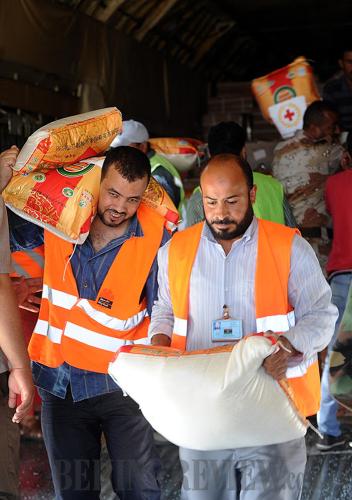|
 |
|
HUMANITARIAN AID: Libyan workers unload relief goods including food and medicine offered by the Red Cross Society of China in Benghazi on August 19 (XINHUA) |
The rebels are aware of this. One of the rebel leaders, Husam Najjair told Reuters he is worried about the possibility of rebels turning on each other.
"The first thing my brigade will do is to set up checkpoints to disarm everyone, including other rebel groups, because otherwise it will be a bloodbath," he said. "All the rebel groups will want to control Tripoli. Order will be needed."
"Despite any measures the rebels may take, conflict among the rebels themselves will be a great issue for post-Gaddafi Libya," said Xu.
National reconciliation
"In the short term, what the rebels need to do when controlling the country is to effectively handle problems related to different tribes, which are likely to arise in the aftermath," said Zhang.
He noted that the rebels actually defeated Gaddafi with the support of the West and thus, it is still questionable whether or not the tribes in the country recognize the legitimacy of any new government.
Libya has more than 140 tribes of different sizes, which are the basis of Libyan politics. During the four decades of Gaddafi rule, he ruled the country by aligning his tribe with other large tribes. "When Gaddafi steps down and the new government takes over power, the interests of different tribes are bound to surface. This will require the new government to be careful in dealing with Gaddafi's followers and officials from the Gaddafi regime, as well as Gaddafi's mercenary soldiers, who are mainly from the surrounding countries like Chad and Mali," said Zhang.
According to Zhang, the best way is to seek reconciliation after disarming. "Otherwise, the situation in Libya will be worse than it is now, or even be more divided," he said.
Xu viewed the issue from another angle. "To keep the country stable during the transitional period, it makes sense for the new government to use the officials from the Gaddafi government because they have the knowledge and experience of how to rule the country," he said. "This experience is precisely what the new government will lack." He added that an inclusive government is needed for the transitional period in Libya, but establishing it will be a major challenge.
Economic reconstruction
Economic reconstruction is another major factor for the new government, since the five-month war has destroyed Libya's
economy and infrastructure. Though rich in oil, Xu believes that it will take two or more years for the country to recover its economic level to the pre-war period. "Definitely the Western countries will interfere in resource production of Libya. That's why they have helped the rebels topple Gaddafi," said Zhang, adding that the country also needs support from the West for its long-term economic development.
Zhang said although Libya relies on the West for its resource development, it also needs other countries like China in its economic recovery, especially in infrastructure construction. "China has huge foreign exchange reserves and abundant experience in economic reconstruction, which can help the war-torn country," said Zhang.
Just before the war broke out in March, most Chinese companies stopped their projects in Libya and returned to China. But, according to Wang Qimin, a counselor of the Chinese ad hoc working group in Benghazi, some Chinese companies such as ZTE and Huawei, two of China's leading information and communications technology solutions providers, have returned to Benghazi, which is relatively calm, to resume their previous work.
In an interview with Xinhua News Agency on August 17, NTC Vice President Abdel-Hafidh Ghoga said that the NTC would respect all deals and contracts the Muammar Gaddafi Government had signed with Chinese companies.
"The NTC welcomes Chinese enterprises back to the country to complete existing projects," he said. | 